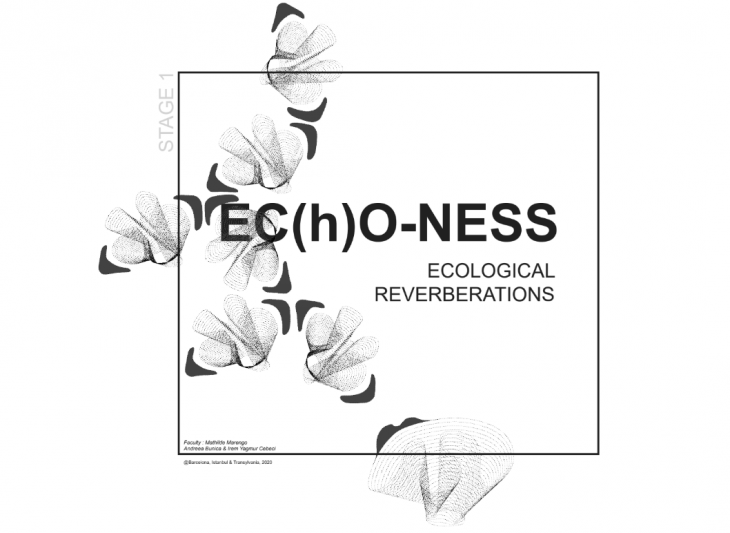
Ec(h)o-ness: Ecological reverberations / Stage 1 has been developed as part of the IAAC/ MRAC Applied Theory seminar, 2019/2020, between Barcelona, Istanbul and Transylvania.
Faculty: Mathilde Marengo; Students: Andreea Bunica, Irem Yagmur Cebeci
Mini-foreword:
Customarily, we would like to occupy digital space on the IAAC Blog as well for expressing our thankfulness to the people and events that have supported our scale-jumping research so far.
The paper stands as a first step towards questioning ecological thinking, in a continuous explorative process towards pushing the boundaries of cross-disciplinary science towards incorporating philosophical, “larger-than-life”, larger-than-human paradigms; towards pushing architecture out of its architecture-ness and more towards becoming an open-source hyper-entity, with as many ways of access as its number of users. We treat ec(h)0-ness as the first thought-brick, the first intention-object, never-finished-scaffold in the process of laying our own philosophical foundations of representing, building, constructing and interacting with the hyper-space; the space of all others, the space that we may may never humanly be able to perceive.
Ec(h)o-ness is never finished. The current paper collates together some first ways of understanding- this can double as a disclaimer; nothing should be taken as is, everything should be understood as never-ending-hyper-meanings process work.
Abstract:
The paper is questioning ecological thinking in relation to the design of our built environments, debating whether the development of biological construction protocols- an apparent “loss” of control- is the key towards reconciling, disrupting, settling for chaos, living through the messiness of our futures. We question the transcending implications of building with biology across political, economical, anthropological and psychological strata in the context of deepening social, climatic and technological injustice as a reaction to our action as human species. We question the implications of not just using biology, but being biology, in all its vastness and ambiguity.
PRELUDE
Can biology be synthetic?
Can the adjective synthetic be scientifically attributed to the lexicon of biology?
Can synthetic biology transgress the anthropomorphic order towards transitioning to the new nature?
Within the process of human cognition and its associated sentience, we– as species, begin to fathom (physically) the lack of humour in the fatalistic morbidity of long-professed, vastly studied, analytically predicted, desperately warned, vocally protested cataclysmic near futures; more often than not, even cataclysmic ‘now’s. We– humans, as a race- are directly under threat.
Motivated by implacable morbidity, we must reconsider our relationship with land- we must reconsider the way we construct, we interact, we inhabit, we consume earth. We need to reconcile with our nature. Within this context, we question syntheticism. We question biology. We question the way human architecture manifests and transforms environment- nature – and ultimately, the role our very own interactions with nature play in the unfolding of our collective future. The goal of this paper is to question the possibility of developing conscious- this time– symbiotic construction processes through the introduction of synthetic (?) biology as an early design tool and to study the repercussions such an action could propagate across social, political and environmental strata.
But what is nature?

Full text available on ISSUU: click here to view
Nature, life and Earth as viewed from the human perspective:
Follow us on Instagram: @synthetic.me